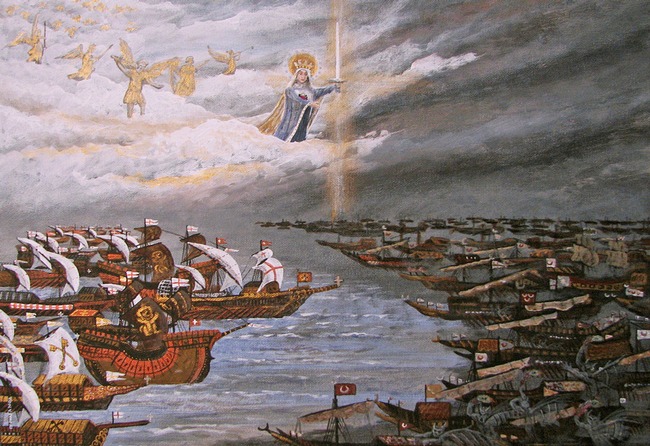When Deliver Us From Evil was screening in cinemas few years ago, I took advantage of a free Saturday evening and watched it.
It is the only movie which has ever caused me to weep. At its end I staggered back to the seminary in shock. I remember spending hours in the chapel that night — and in the days and weeks afterwards — processing what I had seen. And asking: do I really want to give my life to the Church?
I was no naïf, but my faith in the Church had never been so badly shaken. In fact I had to renew my faith in the Church. I think this is just another way of saying I had to renew my faith in the Holy Spirit. Faith in the Holy Spirit is not a vague belief in God’s ephemeral presence in the world. Faith in the Holy Spirit is faith in Christ. Faith in Christ’s sacraments. Faith in Christ’s Church.
We can’t truly believe in the Holy Spirit, I think, unless we love the Church, and trust the Church. It’s much easier to say “I trust the Holy Spirit,” than it is to say “I trust the Church.” But for Catholics the former can only have meaning if the latter is also uttered.
William Day kind of gets this. In ‘Don’t tell the Cathedral’ he is able to discern what secular coverage of the Church so easily obscures: ‘the Church’ isn’t equivalent to ‘the hierarchy and the Magisterium.’ He rightly claims, “Public assessment of the Catholic Church must not make the mistake of throwing the baby out with the bathwater.”
Unfortunately, he is a too zealous in his definition of what constitutes bathwater, and seems to end up excluding the hierarchy and the Magisterium from the authentic Church. I’m not sure how a rejection of Catholic tradition could possibly be a panacea for the Church.
But I can at least agree with him on this:
Within the church there is a tendency to trust that the Spirit will work at its own pace and in its own time – usually slowly.
He calls this a “grumbling patience,” and perhaps it is for the most part. But the saints show us how to apply it more serenely and cheerfully:
I seemed not to recognise the presence of the Bishop and priests as I knelt before the judgment seat. But I felt such a love for their office. A love and sort of reverence for the very sentence which I knew was being in full force passed upon me. I do not know how to describe the feeling but I was intensely happy and felt nearer to you than I had ever felt before. I shall never forget the sensation of the calm, beautiful presence of God.
That — as most readers probably already know — is a firsthand account of St Mary MacKillop’s excommunication, related by her in a letter to Fr Tenison Woods.
I don’t think it’s sufficient to believe that the Holy Spirit is in the mess of the Chuch, somewhere, and then spit in the direction of the hierarchy confident that the Spirit isn’t there. Faith in the Holy Spirit means loving the Church, and its traditions, and showing due reverence even towards human agents we have rightful cause to resent. Because the Holy Spirit is there, in spite of everything.
This has nothing to do with quietism or blind obedience. Nobody could accuse St Mary of the Cross of that.
It has everything to do with a supernatural outlook, which can shift one’s focus to how God acts, rather than how humans react. Dissent and disobedience may be satisfying, especially if it’s righteous. But that’s nothing more than a human reaction to a human reaction. A distraction from divine action. That is what the Church is: divine action. God acting in the world. Concretely. In the midst of our human mess.






Powerful post, Fr John. One of the uglier planks of all-pervading modernism is the spirit of disobedience. Perhaps it is THE basis of modernism. Priests make up the rubrics as they go along, Catholics don’t even know what the Church teaches and the bishops are suffering the consequences (clerical sexual abuse) of rejecting Humanae Vitae; even if only by their antecedents.
Read recently 82% of Catholics think contraception is OK. When did we last read or hear a homily on the evil of contraception?
I find my world shrinking as I worry about participating in devotions during which liturgical precepts are ignored or mutilated.
Thank you father for critiquing that…screed. Trust ‘The Age’ to publish something like that!
It’s a reminder that such people still have quite a bit of energy left in them. Obviously the past wasn’t perfect, but there were many aspects of it that can be said to be better than the present state of the church.
When I hear/read about the abuse crises and people like the author of that…screed, I’m reminded of the words of our Pope (whom they hate more than they hate Pell)
“…attacks on the Pope and the Church come not only from without, but the sufferings of the Church come precisely from within the Church, from the sin existing within the Church. This too is something that we have always known, but today we are seeing it in a really terrifying way: that the greatest persecution of the Church comes not from her enemies without, but arises from sin within the Church, and that the Church thus has a deep need to relearn penance, to accept purification, to learn forgiveness on the one hand, but also the need for justice. Forgiveness does not replace justice. In a word, we need to relearn precisely this essential: conversion, prayer, penance and the theological virtues. This is our response, we are realists in expecting that evil always attacks, attacks from within and without, yet that the forces of good are also ever present and that, in the end, the Lord is more powerful than evil and Our Lady is for us the visible, motherly guarantee of God’s goodness, which is always the last word in history.”
http://www.vatican.va/holy_father/benedict_xvi/speeches/2010/may/documents/hf_ben-xvi_spe_20100511_portogallo-interview_en.html
Thank God our our Pope and his leadership!
Brilliant. You said you had a couple of good posts cooking, and you haven’t failed to come through. Legend.